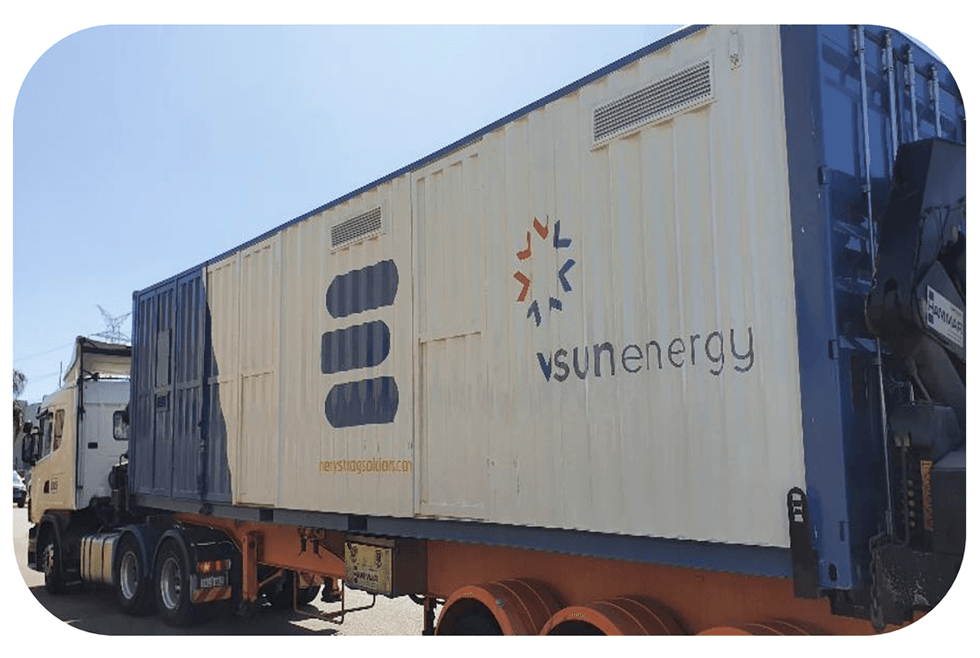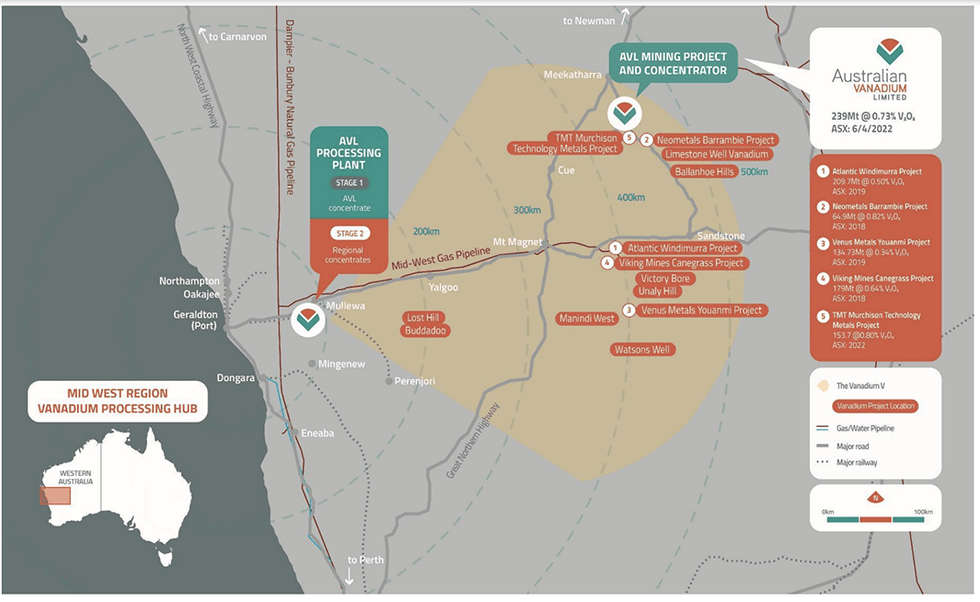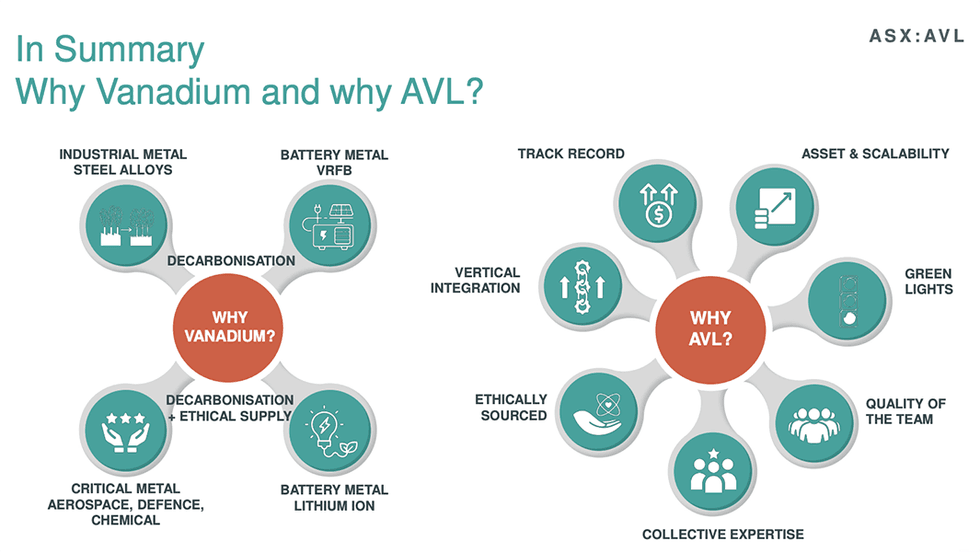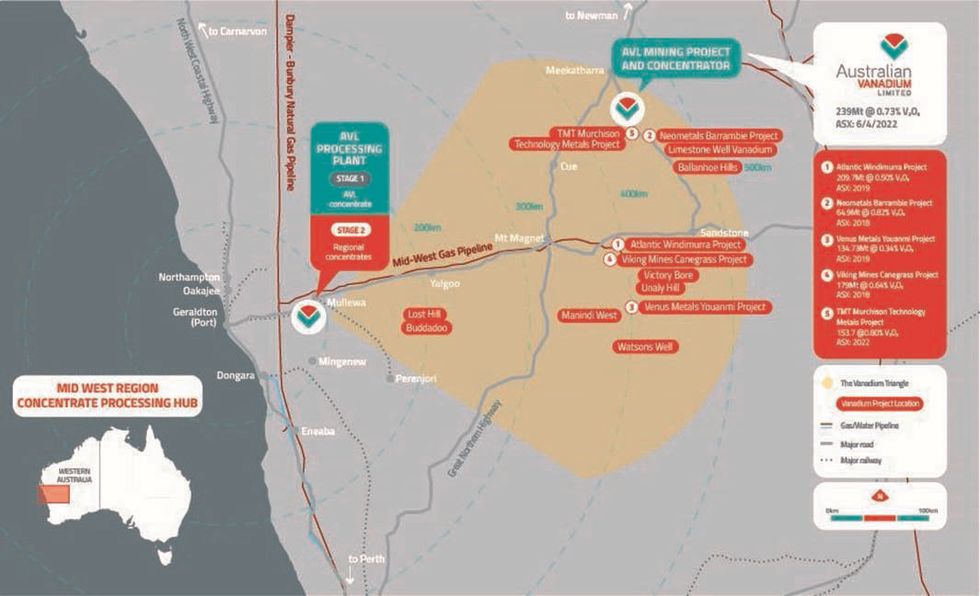Vanadium doesn’t get quite as much attention as other critical and battery metals, but it should.
Resistant to breakdown from both acid and salt, it adds considerable strength, heat resistance and toughness to steel when alloyed. Unsurprisingly, these characteristics have made vanadium a critical mineral for defense applications, particularly as vanadium need only be present in small amounts to impart its benefits. For the past twenty years, demand for the metal in the steel sector has steadily increased. With the recent push for clean energy and net-zero emissions, that demand is set to rise exponentially.
Australian Vanadium (ASX:AVL, FRA:JT71, OTC:ATVVF), which holds one of the most advanced high-grade vanadium deposits in the world, has placed significant focus on developing its Australian Vanadium Project, a high-grade vanadium, titanium and iron resource situated roughly 43 kilometers south of the mining town of Meekatharra in Western Australia.
Vanadium’s potential goes well beyond construction steel. The metal is also used extensively in multiple industries, including aerospace, defense and as a chemical catalyst. What’s most notable, however, is vanadium’s status as a battery metal, specifically one suited for long-term, large-scale energy storage.
By no means a new technology, the vanadium redox flow battery (VRFB) was first invented in 1984 at the University of New South Wales in Australia. Early VRFBs had to be the size of approximately one to two basketball courts to adequately perform, but the technology has been refined over the years since and today’s VRFBs are only a third of the size of their colossal predecessors, with a significantly higher energy capacity.
As businesses and governments seek battery storage for large-scale use cases, demand is expected to increase further, with the VRFB market accounting for more than ten percent of all vanadium production by the end of 2023. Demand for vanadium is expected to double by 2032, with 90 percent of this demand driven by VRFBs.

Australian Vanadium is also working to cultivate Australia’s burgeoning VRFB market, through its wholly owned subsidiary VSUN Energy. VSUN Energy’s current projects include the installation of a VRFB to power an industrial chlorinator, as a standalone power system for a bore pump at a major nickel project, and to power the systems at an orchard in Victoria. VSUN Energy is also consulting with several major mining clients.
The major component of a VRFB is vanadium electrolyte. This solution of vanadium mixed with acid and water will be manufactured by AVL at a facility being constructed in the Perth region.
Both VSUN Energy and the AVL are part of Australian Vanadium’s vertically integrated strategy, through which it intends to support every stage of VRFB production. This will, the company maintains, give it the ability to not only produce the world’s highest-quality vanadium, but also tailor that vanadium to its customers’ needs.

Located in Western Australia’s Murchison Province, the Australian Vanadium Project (AVL) consists of 15 tenements covering roughly 200 square kilometers. Upon completion, the project will consist of an open cut mine and a processing plant near the port city of Geraldton. Australian Vanadium is also constructing an electrolyte manufacturing facility which is slated to begin production in the latter part of 2023.
Situated in Perth, the 33MWh per annum plant will leverage proven technology sourced from US Vanadium LLC. Australian Vanadium has completed a detailed design schematic and ordered long lead equipment for the plant.
As one of the world’s most advanced in-development vanadium projects, the AVL Project has national strategic significance to Australia’s critical mineral supply chains. To that end, the project has been recognized by both the Australian federal government and the Western Australian government, receiving multiple grants for a combined total of roughly $49 million.

The AVL deposit consists of a basal massive magnetite zone overlaid by five lower-grade mineralized magnetite-banded gabbro units, each of which is between 5 and 30 meters thick. Vanadium mineralization can be found in both the massive magnetite horizon and the lower-grade gabbro horizons. The deposit is further divided into kilometer-scale blocks by a series of regional scale faults; the blocks show little sign of internal deformation and strong consistency in layering.
In late April 2023, Australian Vanadium’s processing plant was approved by the city of Greater Geraldton, pushing the crushing, milling and beneficiation plant one step closer to commencing construction. Once completed, the plant along with the mine will provide high-purity vanadium oxide and an iron-titanium co-product.
Project Highlights:
- Government-recognized: In recognition of its national significance, the AVL Project was awarded Federal Major Project Status by the Australian government in September 2019. It was also awarded State Lead Agency Status by the Western Australian Government in April 2020.
- Promising Feasibility Study Results: According to a bankable feasibility study released on April 6, 2022, the project contains 239 million tons (Mt) at 0.73 percent vanadium pentoxide (V2O5) consisting of:
- measured mineral resource of 11.3 Mt at 1.14 percent V2O5
- indicated mineral resource of 82.4 Mt at 0.70 percent V2O5
- inferred mineral resource of 145.3 Mt at 0.71 percent V2O5
- High-grade Magnetite: Australian Vanadium’s initial assessment of the project also indicates the presence of a distinct massive magnetite high-grade zone of 95.6 Mt at 1.07 percent V2O5.
- Other Minerals: In addition to vanadium, the AVL project also contains estimated cobalt, nickel and copper resources.
- Broad Focus: Rather than solely targeting the battery market, Australian Vanadium intends to serve all sectors that require the critical metal. This includes the steel, titanium master-alloy, aerospace and specialty chemicals markets.
- Sustainable Production: Australian Vanadium intends to operate its mine ethically and with a low-carbon footprint through the use of solar and wind generation along with electric or green-hydrogen-fueled vehicles.
- Longevity and Scalability: Once operational, the mine will have an estimated lifespan of more than 25 years, while the configuration of the processing facility will allow the company to quickly scale production as necessary.
Management Team
Cliff Lawrenson – Non-executive Chair
Cliff Lawrenson has more than 10 years of experience as a non-executive chair and non-executive director in both public and private companies. He is currently non-executive chair of Paladin Energy Ltd (ASX:PDN) and Caspin Resources (ASX:CPN) and non-executive chair of privately owned Pacific Energy Limited and Onsite Rental Group.
Lawrenson was managing director of Atlas Iron Ltd from 2017 and led the company to its acquisition by Hancock Prospecting Pty Ltd. Prior to Atlas Iron, Lawrenson served as managing director of a number of ASX-listed companies in the mining and mining services sectors. Lawrenson was also a senior executive of CMS Energy Corporation in the United States of America and Singapore, preceded by an investment banking career.
Graham Arvidson – Chief Executive Officer
Graham Arvidson has 18 years of experience in the minerals sector spanning feasibility, evaluation, successful development and operation of mineral assets globally and across a broad range of commodities including deep experience in vanadium, lithium, nickel and other future-focused battery metals.
Arvidson has proven project development expertise, a deep Western Australian project development network specific to mining, commercial acumen borne of managing contracts from both the client and contractor side and extensive project management experience in tendering, negotiation, conforming and managing O&M, EPC, EPCM, EPC-O and BOO forms of project delivery.
Todd Richardson – Chief Operating Officer
Todd Richardson BSc ChE MBA is an expert in vanadium process design, commissioning and operations with over 20 years’ experience in vanadium. He has an extensive background in operations management and technical services both in the USA and Australia in all phases of plant operation – process design through commissioning, ramp up and operation. Richardson leads the development of AVL’s world-class vanadium project.
Tom Plant – Chief Financial Officer
Tom Plant is a seasoned chartered accountant and finance executive with almost 30 years of experience in various corporate and commercial roles. He has a strong background in debt and equity funding solutions, investment evaluation and corporate transactions. Plant recently served as interim CFO at Leo Lithium, which developed the Goulamina Lithium Project in Mali. Prior to that, he was the CFO at Firefinch and spent 10 years at global mineral sands and rare earths producer Iluka Resources. He held various positions in investment banking and professional services with Macquarie Group, Dresdner Kleinwort Wasserstein and Arthur Andersen.
Daniel Harris – Technical Director
Daniel Harris is a vanadium industry veteran and has an understanding of the resource sector from both a technical and financial perspective. He is currently non-executive director of US Vanadium LLC, Queensland Energy & Minerals (ASX:QEM) and Flinders Mines (ASX:FMS). He is an advisory board member and vanadium consultant for Blackrock Metals.
Previous roles include interim CEO and managing director at Atlas Iron; chief executive & operating officer at Atlantic; vice-president and head of vanadium assets at Evraz Group; managing director at Vametco Alloys; general manager of vanadium operations at Strategic Minerals Corp and acting as an independent technical and executive consultant to GSA Environmental Limited in the United Kingdom.
Miriam Stanborough – Non-executive Director
Miriam Stanborough is a chemical engineer with over 20 years of experience in the mineral processing industry across a range of commodities. She has held senior roles at Monadelphous, Iluka Resources, Alcoa and WMC Resources. Her skill base spans innovation and technology, technical development, production management, project management, business improvement and people and culture.
Stanborough is currently a non-executive director of Pilbara Minerals Limited (ASX:PLS), BCI Minerals Limited (ASX:BCI), chair of the Minerals Research Institute of Western Australia (MRIWA), deputy chair of the Northern Agricultural Catchments Council (NACC), and a director of Scouts WA.
Peter Watson – Non-executive Director
Peter Watson is a chemical engineer with 40 years of experience in senior technical, project and management roles in addition to corporate experience running ASX-listed companies. He has significant board-level experience, particularly regarding safety, governance, financial reporting, risk management and strategy.
Watson is currently a non-executive director of Paladin Energy Ltd (ASX:PDN), New Century Resources (ASX:NCZ) and Strandline Resources Limited (ASX:STA).
Neville Bassett – Company Secretary
Neville Bassett is a Chartered Accountant operating his own corporate consulting business, specializing in the area of corporate, financial and management advisory services. Bassett has been involved with numerous public company listings and capital raisings.
His involvement in the corporate arena has also taken in mergers and acquisitions and includes significant knowledge and exposure to the Australian financial markets.
Bassett has a wealth of experience in matters pertaining to the Corporations Act, ASX listing requirements, corporate taxation and finance. He is a director or company secretary of a number of public and private companies.
Louis Mostert – Chief Legal and Compliance Officer, Joint Company Secretary
Louis Mostert has over 20 years of experience in project contracting and finance, corporate advisory, mergers and acquisitions, insurance management, dispute resolution, work health and safety, employment and industrial relations, intellectual property, corporate governance and compliance.
Mostert graduated from the University of Western Australia with a Bachelor of Engineering (Hons) and a Bachelor of Laws (Hons) and has a Diploma of Applied Corporate Governance from the Governance Institute of Australia. He is admitted as a barrister and solicitor of the Supreme Court of Western Australia, a fellow of the Chartered Institute of Secretaries, a fellow of the Governance Institute of Australia and a member of the Institute of Company Directors.
Samantha McGahan – VSUN Energy Manager
Samantha McGahan BEd (Hons) GAICD has over 25 years experience in a diverse range of industries spanning education, law and technology. She has led the development of VSUN Energy since 2016 and fosters a strong network in both vanadium and energy markets. Samantha is experienced in marketing and leads both AVL and VSUN Energy’s social media and marketing strategies.
Credit: Source link




